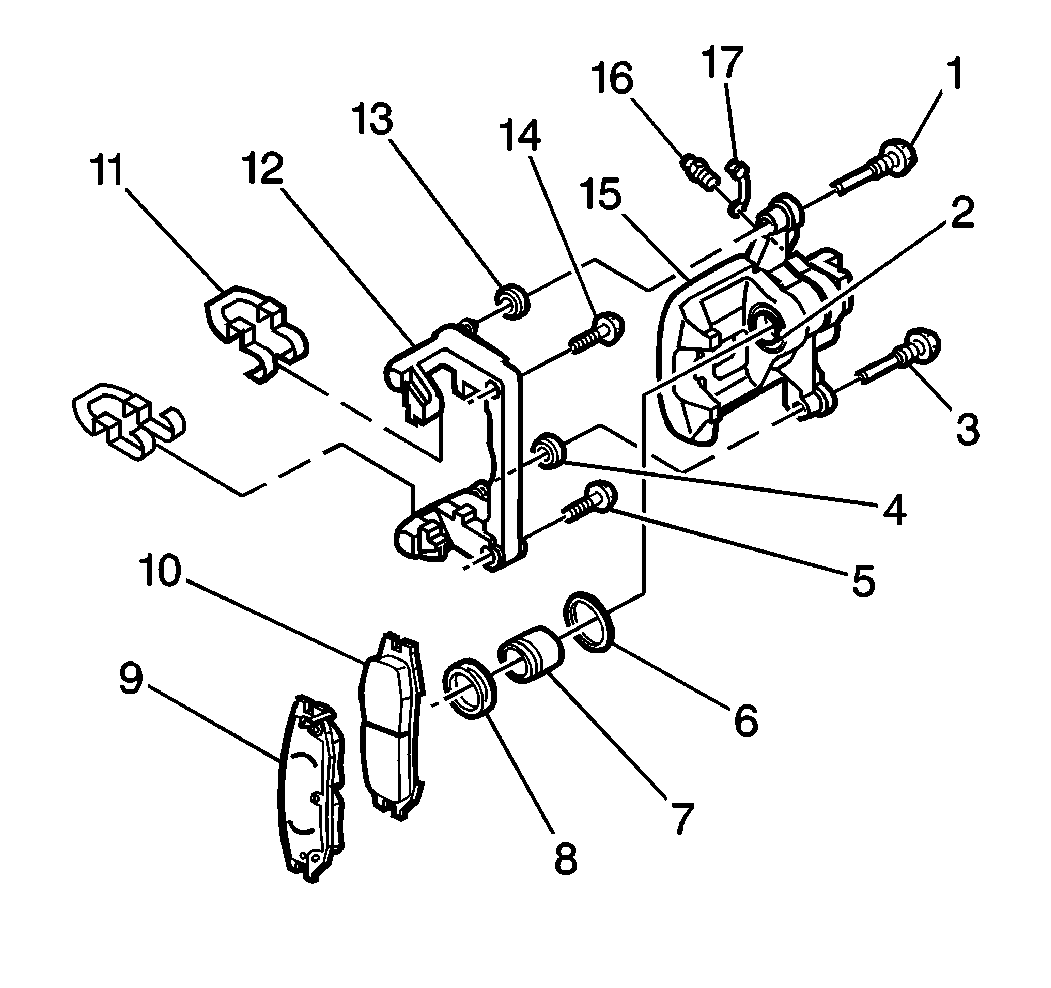Removal Procedure
Caution: Refer to Brake Dust Caution in the Preface section.
- Inspect the fluid level in the brake master cylinder reservoir.
- If the brake fluid level is midway between the maximum-full point and the minimum allowable level, then no brake fluid needs to be removed from the reservoir before proceeding. If the brake fluid level is higher than midway between the maximum-full point and the minimum allowable level, then remove brake fluid to the midway point before proceeding.
- Raise and support the vehicle. Refer to Lifting and Jacking the Vehicle in General Information.
- Remove the tire and wheel. Refer to Tire and Wheel Removal and Installation in Tires and Wheels.
- Remove the disc brake caliper bolts (1,3).
- Using a C-clamp installed to the center of the outer disc brake pad and the back of the caliper, slowly compress the caliper piston into its bore just enough to remove the caliper from the mounting bracket (12).
- Remove the disc brake caliper (15) from the mounting bracket.
- Remove the disc brake pads (9, 10) from the disc brake caliper bracket.
- Remove the disc brake pad retainers (11) from the disc brake caliper bracket.
- Remove the disc brake caliper bolt boots (4, 13) from the caliper mounting bracket.
- Lightly wire brush all brake pad contact areas in order to remove any corrosion.
Notice: Support the brake caliper with heavy mechanic wire, or equivalent, whenever it is separated from its mount and the hydraulic flexible brake hose is still connected. Failure to support the caliper in this manner will cause the flexible brake hose to bear the weight of the caliper, which may cause damage to the brake hose and in turn may cause a brake fluid leak.

Installation Procedure
- Lubricate with a high temperature silscone brake lubricant and install the caliper bolt boots (4, 13) to the disc brake caliper mounting bracket (12).
- Lubricate with a high temperature silscone brake lubricant and Install the disc brake pad retainers (11) to the disc brake caliper bracket.
- Install the disc brake pads (9, 10) to the disc brake caliper bracket.
- Install the disc brake caliper (15) to the mounting bracket.
- Install the disc brake caliper bolts (1, 3) .
- Apply and release the brake pedal (3/4 stroke) as many times as necessary in order to obtain a firm brake pedal.
- Install the tire and wheel. Tire and Wheel Removal and Installation in Tires and Wheels.
- Lower the vehicle.
- Fill the master cylinder to the proper level with new clean brake fluid. Refer to Master Cylinder Reservoir Filling in Hydraulic Brakes.

Notice: Use the correct fastener in the correct location. Replacement fasteners must be the correct part number for that application. Fasteners requiring replacement or fasteners requiring the use of thread locking compound or sealant are identified in the service procedure. Do not use paints, lubricants, or corrosion inhibitors on fasteners or fastener joint surfaces unless specified. These coatings affect fastener torque and joint clamping force and may damage the fastener. Use the correct tightening sequence and specifications when installing fasteners in order to avoid damage to parts and systems.
Tighten
Tighten the disc brake caliper bolts to 44 N·m
(32 lb ft).
